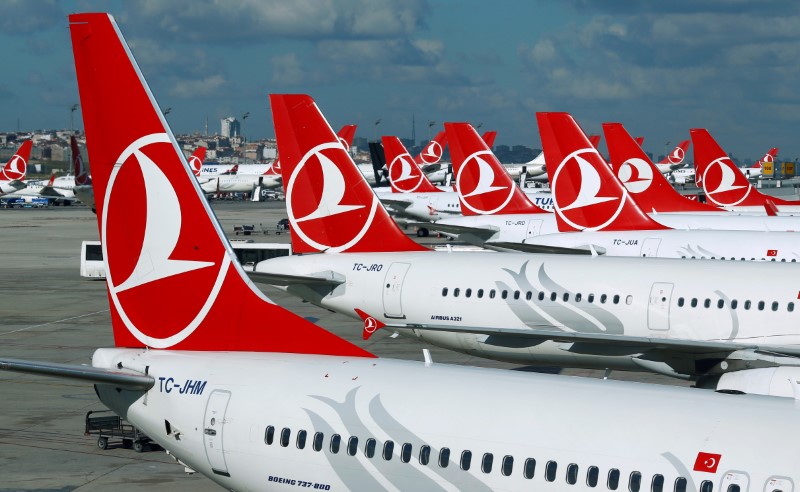By Orhan Coskun
ANKARA (Reuters) - Turkey has transferred government stakes worth billions of dollars in Turkish Airlines, major banks and fixed-line operator Turk Telekom to a sovereign wealth fund set up last year to help finance big-ticket infrastructure projects.
The fund was set up with initial capital of just 50 million lira ($13.6 million) in August, but the government is aiming for it to manage $200 billion in assets as soon as possible, the economy minister has said.
The government hopes it will be able to use the newly transferred assets as collateral to secure funding for major infrastructure projects, one senior official told Reuters.
Some analysts said it would lead to greater political control of the companies.
"There will be a search for credit abroad to implement very big projects in the period ahead," the official said.
"Turkey's most important companies have been transferred to the sovereign wealth fund. It will be possible to secure credit at low rates for these projects by offering the shares in these companies as a guarantee."
The official did not specify which type of projects the wealth fund may help finance. Under President Tayyip Erdogan, who supports using large-scale projects to bolster the construction industry and domestic demand, Turkey has built high-speed railways, suspension bridges and undersea tunnels.
Other planned megaprojects include one of the world's biggest airports in Istanbul and a huge canal that would render a large chunk of the city an island.
Sovereign wealth funds are often associated with oil producers such as Norway or Gulf states. Those countries set aside money from energy exports for investment.
But Turkey imports almost all of its energy and some economists have said the government could better spend money paying down a national debt that runs at roughly 30 percent of economic output.
"A wealth fund is established to utilize public resources that grow with budget surpluses. Ours is to squander public capital that has been accumulated in the past," Refet Gurkaynak, an economist at Ankara's Bilkent University, said on Twitter.
"The establishment of a wealth fund for Turkey, which does not have a budget surplus, is like getting a lighthouse for landlocked Ankara."
BANK, BOURSE AND POST
The state's 49.1 percent stake in flag carrier Turkish Airlines (IS:THYAO) - worth roughly $1 billion - and its 51.1 percent of lender Halkbank (IS:HALKB) - worth some $2 billion - have been transferred to the fund, the privatization administration said on Monday.
Stakes in state-owned Ziraat Bank, the Borsa Istanbul stock exchange and state-owned pipeline operator Botas have also been transferred, according to an announcement in the government's Official Gazette on Sunday. [L5N1FQ0IA]
Holdings in fixed-line operator Turk Telekom (IS:TTKOM), oil company TPAO, the PTT post office, satellite communications company Turksat, Eti Maden mining company and tea producer Caykur have also be transferred.
Shares of Turkish Airlines and Halkbank both weakened slightly on Monday, while Turk Telekom advanced 2 percent.
The companies would retain their existing management and policies after the asset move, Prime Minister Binali Yildirim's office said in a statement.
However, some analysts and opposition politicians said the move would mean greater political control over the companies and a decrease in outside oversight.
"This thing called a wealth fund is essentially a family company ... The people's property, the nation's income is taken out of the budget and transferred to the (presidential) palace's company," Selin Sayek-Boke, vice-president for the economy at the main opposition CHP, told a news conference.
PRESTIGE PROJECTS
Once one of the world's most promising emerging markets, Turkey has been hit by political uncertainty, insecurity and a tumbling lira currency.
Economic output declined in the third quarter for the first time in seven years, and investors worry that long promised structural reforms have been overshadowed by Erdogan's desire to pump up the economy ahead of a planned referendum this spring on strengthening the powers of the presidency.
The wealth fund is an example of the "Erdoganization" of the economy, said Wolfango Piccoli of Teneo Intelligence, an advisory firm.
"The government is currently struggling to finance a series of high-profile infrastructure projects; Erdogan hopes these will boost his domestic prestige and enable him to consolidate his grip on power through the introduction of an executive presidential system," Piccoli said in a note.
The fund is headed by Mehmet Bostan, a former finance sector executive who was appointed head of the OIB privatization board last year. Yigit Bulut, a senior Erdogan adviser, has been appointed to the four-member management board, according to a statement in Turkey's trade registry gazette.
The government has said the fund, while targeting annual growth of 1.5 percent over the next 10 years, will not compromise fiscal discipline.
Some critics are not convinced.
"This government... is establishing a wealth fund to pledge the assets left by our ancestors to borrow and cover up the volatility in the economy until the referendum," said Faik Oztrak, a CHP lawmaker and a former treasury undersecretary.
